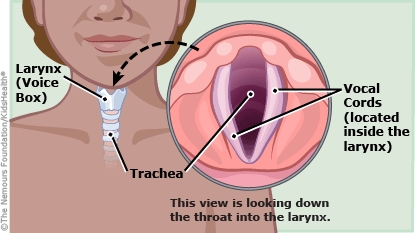Laryngitis is when the vocal cords become inflamed (irritated and swollen). It causes hoarseness. Hoarseness is when a person's voice sounds rough, raspy, weak, or breathy. In kids, laryngitis (lair-in-JYE-tis) is usually caused by a viral infection or by straining the voice through yelling. Resting the voice helps the symptoms get better.



Your child:

Your child's hoarseness suddenly becomes severe and makes it hard for your child to breathe.

What are the vocal cords? The vocal cords are delicate bands of tissue in the larynx (LAIR-inks), or voice box. When we speak, air pushes out of the lungs and passes through the vocal cords, causing them to vibrate. This vibration, combined with the movement of the tongue, lips, and teeth, is what makes the sound of the voice.
Why does laryngitis happen? Laryngitis happens when something irritates the vocal cords, such as:
What happens if the laryngitis doesn't go away? Laryngitis that lasts more than 2 weeks is called "chronic laryngitis," and it can lead to "chronic hoarseness." If this happens, your health care provider will refer your child to an otolaryngologist (an "ear, nose, and throat" [ENT] doctor) and a speech pathologist. These specialists can do tests to find out what is causing the laryngitis and make a treatment plan to help your child.